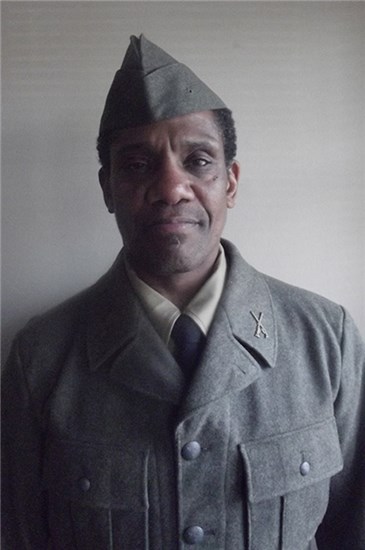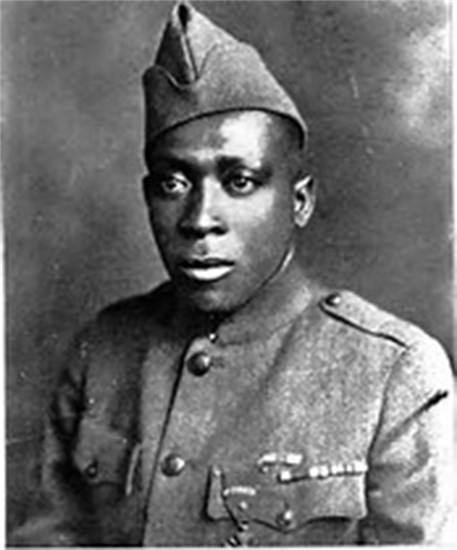

Sgt. Henry Johnson (1892 - 1929)
By Keith Henley
Essay
“We hold these truths to be self evident, that all men are created equal, that they are endowed by their creator with certain unalienable rights, that among these are life, liberty, and the pursuit of happiness.”
Almost a hundred years after Thomas Jefferson wrote these inspiring words, the Civil War broke out and black and white Americans bore arms, bled and died for their differing concepts of freedom. Our pride in the concept of equality gave us hope for opportunity for the deprived citizens of our country. And yet all Americans, especially black Americans, were still not protected under the laws of the land. Instead they were faced with new demons. The KKK formed in 1860, giving racism a new face, and Jim Crow Laws established between 1874 and 1975 to separate whites and blacks in the American South were enforced with ignorance, intolerance, and a cold heart. The oppressed black man and woman still rise and demand acceptance in the land of the free which has no regard or respect for their existence.
Countless stories of blacks striving to improve and secure their rights as citizens of America fill in the details of this struggle: James Forten, Civil Rights activist; Bishop Richard Allen, founder of the African Methodist Episcopal Church in 1794, the first independent black denomination in the United States; William Still, Father of the Underground Railroad; Booker T. Washington, Educator and founder of Tuskegee Institute; Phyllis Wheatley, poet; and Madam C.J. Walker, Millionaire Businesswoman.
More than a hundred years had passed since Jefferson wrote those words and yet blacks continued to fight for equality, life, liberty, and the pursuit of happiness in America when
Henry Johnson was born in Winston Salem, North Carolina. He moved north as other blacks did to secure a new life for himself. He found whatever jobs he could, but when the call came for volunteers to fight in WWI he enlisted in the United States Military on June 5, 1917, joining the all-black New York National Guard 15th Infantry Regiment, which, when mustered into Federal service was redesignated as the 369th Infantry Regiment, later known as the Harlem Hellfighters. Johnson wanted to serve the country that he loved with pride in his heart. Harrassed by fellow American white soldiers and “loaned” by General Pershing to France because white soldiers refused to fight beside them, the French welcomed the black American troops and Johnson on New Year’s Day 2018. There was nothing that he wouldn’t do for his country, though she despised his presence. Even in war he was denied his rights. He represented his country with honor and valor and saved lives. Then he returned home to fight for acceptance.
Why would a race of people defend a country that despises them? They fight because by the grace of God and the force of truth, the dangerous hampering walls of prejudice and inhuman injustices must fall. They fight because they want their children to live in a better land and enjoy fairer conditions than have fallen their lot. They continue to fight and will fight until the day will come when all God’s children black and white, regardless of race, creed, or color will one day walk hand in hand, sing and tell the glorious story of how they destroyed the barriers of hate with love and understanding.
Keith Henley
Keith H. Henley is an actor, historic interpreter, playwright, baker, caterer, singer, and dancer. His many theatre credits include: “Exonerated,” “Dreamgirls,” “Fences,” “Piano Lesson,” “This is Why I Whisper,” ”To Kill a Mockingbird,” and he has performed with the Metropolitan Opera Company, Philadelphia Opera Company, Center City Opera Company and more. His film credits include Bible Stories for Today (Vol. I) The Traveler, Cracked, Confinement, Philadelphia Story, Law and Order and Boardwalk Empire. He also portrays Henry Box Brown, Dr. James Still, Langston Hughes, Matthew Henson, Dr. George Washington Carver, Buffalo Soldiers, Hercules, master chef to General George Washington, and Dr. Martin Luther King Jr.
Recommended Reading
King, Gilbert. “Remembering Henry Johnson, the Soldier Called ‘Black Death.’” smithsonian.com 25 October 2011
Lamothe, Dan. "How the White House and media got it wrong on Medal of Honor recipient
Henry Johnson." Washington Post, 11 June 2015.
Williams, Chad L. Torchbearers of Democracy: African American Soldiers in the World War I Era. University of North Carolina Press, 2010.
Quotes
"We did not give ourselves our name [the 'Harlem Hellfighters'], Our enemies gave us our name, [which] is an honor." --Colonel Reginald Sanders, Commander of 369th Sustainment Brigade
"That day, the sun was shining, and we were marching. And the band was playing. Everybody's head [was] high, and we were all proud to be Americans, proud to be black, and proud to be in the 15th New York Infantry." --Melville Miller, Harlem Hellfighter
Timeline
1892 - Born
1917 - Enlists in Infantry
1918-19 - Served in Frnce with 369th U.S. Infantry Regiment, awarded the French Croix de Guerre for battlefield valor
1929 - Died
1996 - Awarded the Purple Heart
2002 - Awarded the Distinguished Service Cross
2015 - Awarded the Medal of Honor